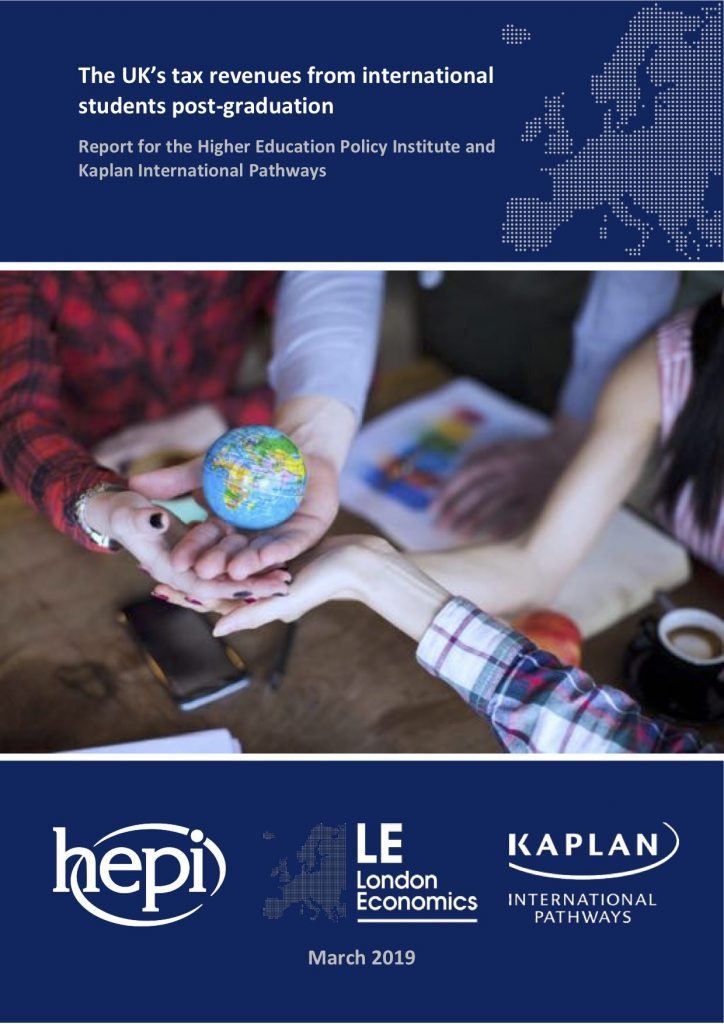Just one cohort of international students who stay in the UK to work pay £3.2 billion in tax – and they aren’t taking jobs from UK citizens

The Higher Education Policy Institute (HEPI) and Kaplan International Pathways (Kaplan) are today publishing new research commissioned from London Economics on the financial contributions of international students who graduate from higher education and stay in the UK to work.
The UK’s tax revenues from international students post-graduation shows the tax and National Insurance payments of just one cohort of international students who stay in the UK to work after their studies amounts to £3.2 billion.
This is made up of:
- over £1 billion in income tax;
- over £700 million in employees’ National Insurance Contributions;
- over £800 million in employers’ National Insurance Contributions; and
- nearly £600 million in extra VAT payments.
Graduates from other EU countries who stay here to work contribute £1.2 billion and graduates from the rest of the world contribute £2.0 billion.
The analysis additionally shows international graduates who find employment in the UK typically do so in sectors that suffer from acute skills shortages. Rather than displacing domestic graduates, international graduates are plugging skills shortages.
The study also measures the impact of the Home Office limiting post-study work rights in 2012. This costs the Treasury £150 million each year in foregone receipts – that is, £750 million every five years or just over £1 billion since post-study work was first restricted in this way in 2012.
Nick Hillman, Director of HEPI, said:
“Universities firmly believe the Government’s biggest mistake in higher education has been to discourage international students from coming here. A hostile environment has been in place for nearly a decade. It is a testament to the strengths of our higher education sector that the number of international students has not fallen, but it is an absolute tragedy that we have been unable to keep up with the pace of growth in other countries.
“The Home Office used to say there is insufficient evidence to show international students bring benefits to the UK. We proved this to be false last year, when we showed international students contribute £20 billion a year net to the UK. But, afterwards, the Migration Advisory Committee claimed there was still a lack of evidence to show international students who stay in the UK to work make a positive contribution.
“We can now disprove this too. Just one cohort of international students who stay in the UK to work contribute over £3 billion to the UK Exchequer – and it would be even more if policymakers had not reduced post-study work rights in 2012. The hard evidence shows a new approach is overdue.”
Linda Cowan, Senior Vice President, Kaplan International Pathways, said:
“Restricting post-study work rights for international graduates has hampered efforts to attract students to the UK, with the number arriving here growing more slowly than in other countries. Proposals in the Government’s White Paper to introduce a minimum salary threshold of £30,000 would undoubtedly make us even less competitive. This places real risk to the UK of losing the significant economic, educational and soft power benefits this country has enjoyed for many years.
“We now have evidence that one of the many ways international students contribute to our economy is by filling skills shortages. Given their high level of English competency and impressive academic achievements, we should be doing everything possible to encourage them to stay and work here. To do this, we need to reinstate attractive and competitive post-study work rights for all international students. We must go further than the recommendations in the Migration Advisory Committee report, and included in the Government’s recently released International Education Strategy, which would continue to place the UK behind other countries.”
Ms Maike Halterbeck, Associate Director at London Economics, and lead author of the report, said:
A detailed analysis of the most up-to-date labour market data has illustrated the huge economic contribution of international graduates to the UK economy in the first 10 years following graduation. However, the contribution of more than £3 billion hides the fact that in the longer term, this contribution is likely to be many times higher as international graduates make the UK their home.
Matthew Percival, CBI Head of Employment policy, said:
UK universities punch well above their weight when it comes to attracting students from overseas – and have the potential to grow even further. HEPI’s research is an important contribution to filling the knowledge gap identified by the Migration Advisory Committee. It shows the significant economic benefits that come when international students remain in the UK to work – particularly in addressing shortages in key sectors like engineering.
For universities to reach their potential, the Government must ensure that international students have reasonable time to find a skilled job after completing their studies.
In September 2018, the Migration Advisory Committee failed to recommend the creation of a new post-study work visa, at least until there is “a proper evaluation, by us or others, of what students are doing in the post-study period and when they move onto other work permits.”
The new HEPI / Kaplan report provides this evaluation by:
- Evaluating whether international graduates are competing with UK graduates in areas with skills shortages;
- Assessing the proportion of EU-domiciled and non-EU-domiciled graduates in sustainable employment in the UK in the 10 years after graduation; considering their median earnings and tax and National Insurance payments; and
- Showing the adverse impact on government revenues of restricting post study work rights for non-EU-domiciled students.
About The Higher Education Policy Institute (HEPI): Established in 2002 to influence the higher education debate with evidence. We are UK-wide, independent and non-partisan. We are funded by organisations and universities that wish to see a vibrant higher education debate as well as through our own events.
About Kaplan International: Supporting the higher education sector worldwide in achieving its internationalisation and diversity ambitions, we specialise in on- and off-campus pathway programmes for international students and innovative growth solutions such as Transnational Education, online delivery, targeted direct student recruitment, and student residences.
About London Economics: One of Europe’s leading specialist economics and policy consultancies. Based in London and with offices and associate offices in five other European capitals, we advise an international client base throughout Europe and beyond on economic and financial analysis, litigation support, policy development and evaluation, business strategy, and regulatory and competition policy.
The new report builds on earlier work published jointly by HEPI and Kaplan on:











Responses